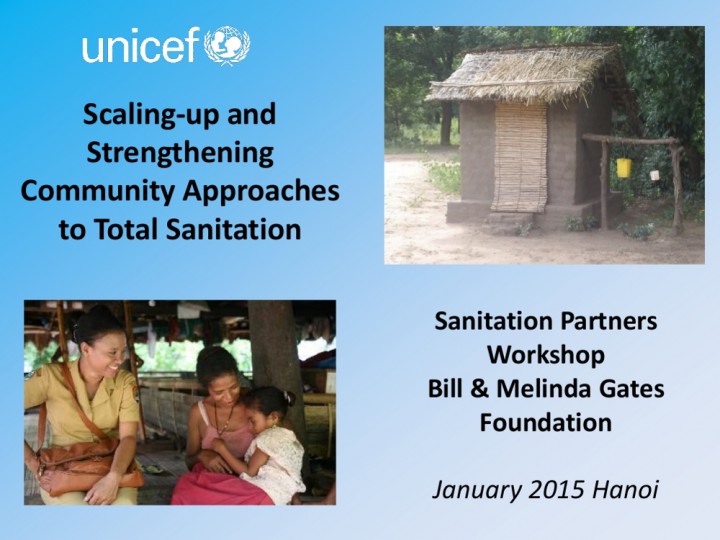Scaling-up and strengthening community approaches to total sanitation (Community Approaches to Total Sanitation, CATS) - Various documents on results from research grant
Various authors (2015)

Published in: 2015
Publisher:
United States Fund for UNICEF
Author:
Various authors
Uploaded by:
danijela milosevic
Partner profile:
common upload
6966 Views
163 Downloads
Location of library entry
Content - Summary
This library entry contains background documents and results for a grant that Lizette Burgers (UNICEF HQ) and Keiko Valente (US Fund for UNICEF) are leading and which is funded by the Bill and Melinda Gates Foundation. Further Information is provided on the discussion forum, see link below.
Short description of the project:
UNICEF is implementing Community Led Total Sanitation (CLTS) or CATS programs in a large number of countries globally, mostly in Africa and Asia. This project is designed to assess and analyze CATS innovations and implementation strategies in two countries - Malawi and Indonesia - and to distil and disseminate lessons learned to other UNICEF country programs in Africa and Asia. Among other goals, the project seeks to meet ambitious Open Defecation Free (ODF) ‘hit rates’ , of 66% and a ‘reach’ target of 85%.
CATS is an umbrella term developed by UNICEF to encompass a wide range of community-based sanitation programming (including CLTS, SLTS, TSC).
With a focus on learning and dissemination, the Regional Offices for East Asia and Pacific (EAPRO) and Eastern and Southern Asia (ESARO) are an integral part of the program and are responsible for:
o providing technical support to implementation countries;
o generating evidence and analysis through studies, assessments etc. for strengthened advocacy at country, regional and global levels;
o facilitating networking and learning exchange opportunities in-country, between countries in the region, cross-regions and across partners, and;
o undertaking the development of the CATS Monitoring Toolkit, case–studies etc., with the aim to strengthen sanitation programs in additional countries through enhanced learning and knowledge exchange both within UNICEF and with its partners.
Goals:
The overall goal of the project is to contribute towards international efforts to increase access to sanitation through the delivery of sustainable sanitation programs at scale in two countries.
The goal is also to contribute towards efforts to achieve the Millennium Development Goal for sanitation through the development and implementation of model approaches in two countries and enhanced global learning for sanitation programming in two regions.
+++++++++++
Documents available for download below:
1 - Presentation about this project at FSM3 Conference in Hanoi, Jan. 2015
2 - Poster on key findings of the impact evaluation of Rural Sanitation Programme in Mali. FSM3 Conference in Hanoi, Jan. 2015 (by Maria Laura Alzua, Amy Janel Pickering, Habiba Djebbari, Juan Camilo Cardenas, Maria Adelaida Lopera, Nicolas Osbert, Massa Coulibaly)
3 - Community-Led Total Sanitation in East Asia and Pacific. Review of the status of community-led sanitation implementation in East Asia and Pacific, March 2013
4 - CLTS and scaling-up rural sanitation learning workshop. Report on side-event of EASAN 3, Bali, 8. /. Sept. 2012
5 - Scaling-up sanitation and hygiene in East Asia and Pacific. Regional learning event. Final report, Bangkok, 10 - 12 December 2013
Bibliographic information
Various authors (2015). Scaling-up and strengthening community approaches to total sanitation (Community Approaches to Total Sanitation, CATS) - Various documents on results from research grant. United States Fund for UNICEF
Filter tags
East Asia & Pacific English Rural Sub-Saharan Africa Sustainable WASH in institutions and gender equality (WG7)














